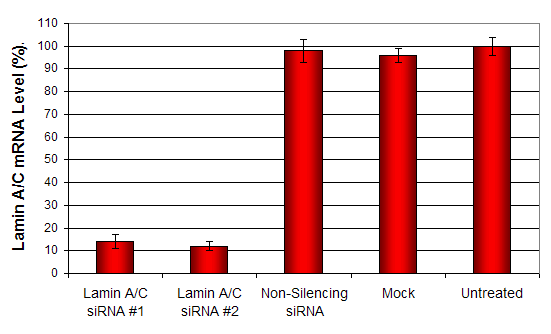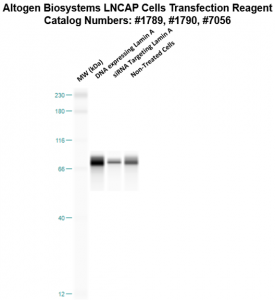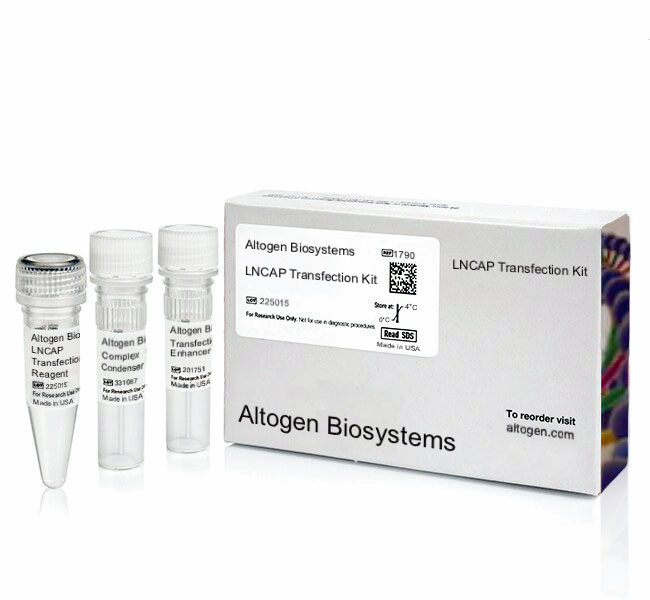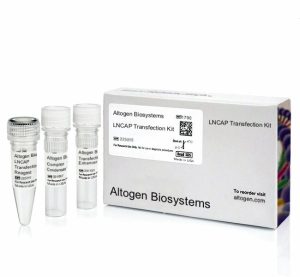Description
Purchase Orders: Click “Add to Cart” button to order, then email PO to orders@altogen.com.
Product Availability: In Stock.
Transfection Reagent for LNCaP Cells (Prostate Carcinoma Cells, CRL-1740)
- A nanoparticle-based liposome formulation
-
Transfection protocols provided for transfection of small proteins, DNA, mRNA, siRNA, shRNA and microRNA
-
Transfection Enhancer and Complex Condenser reagents are included in the kit
-
Produce higher level of recombinant protein expression with minimal disruption of normal cell function
-
Generate physiologically relevant data you can trust
-
Effective for plasmid DNA/siRNA co-transfection
- Low cytotoxicity
-
Download in vitro LnCAP transfection protocol: [PDF]
- Download LnCAP CRISPR/Cas9 transfection protocol: [PDF]
- Download PowerPoint presentation for LnCAP transfection kit: [PPT]
- UPC/GTIN/EAN: 860002089788
-
Brand: ALTOGEN®, developed and manufactured by Altogen Biosystems
Transfection Efficiency:
Reagent exhibits at least 85% transfection efficiency of siRNA delivery. Transfection efficiency was determined by qRT-PCR.
Product Description:
Transfection kit for LNCaP cell line, a human prostate cancer cells. Transfection reagent supplemented by complex condenser and transfection enhancer reagents.
Transfection Protocol and SDS:
Download Altogen Biosystems LNCaP Transfection Protocol: [PDF]
Download SDS: [PDF]
LNCaP Cell Line:
Prostate cancer is considered the most frequent malignancy and the third primary cause of cancer-related deaths among men in the United States, according to the American Cancer Society. Black males have 74% higher odds of developing prostate cancer compared to non-Hispanic white men. With the 5-year survival rate of only 29% for patients with advanced stage disease, further preclinical studies for the development of new treatment regimens are necessary. The LNCaP human prostate adenocarcinoma epithelial cell line is established from the supraclavicular lymph node metastasis of a Caucasian male in 1977 and can grow in aggregates or as a single cell. The LNCaP cells grow readily in vitro, form clones, and are resistant to human fibroblast interferon. In addition to being receptive to hormones, the cell line has a high affinity for androgen receptors in the cytosol as well as nuclear fractions of cells. The cell line expresses prostate specific antigen, and estrogen receptors can be seen in the cytosol. The frequency of the tumor development and the time of tumor appearance are significantly different for males and females. Male mice do develop tumors sooner and at the higher frequency than females. Hormonal manipulations demonstrate that incidence of tumor development correlates with the levels of serum androgen. However, the rate of the tumor growth is not dependent on the gender or hormonal status. The LNCaP prostate cancer cell line is widely used in clinical oncology research. It is considered an appropriate host for studying prostate and hormone functions and is extensively used in drug discovery and different types of biomedical applications. Altogen Biosystems offers nanoparticle-based transfection reagent kits for the LNCaP cell line.
LNCaP cells have several properties that make them useful for research. Firstly, they are relatively easy to culture in the laboratory and can be grown in large quantities. Secondly, they express prostate-specific antigen (PSA) and androgen receptor (AR), which are characteristic markers of prostate cancer. Thirdly, they respond to androgens, making them a useful model system for studying the role of androgen signaling in prostate cancer. Research using LNCaP cells has contributed significantly to our understanding of prostate cancer biology. For example, LNCaP cells have been used to study the effects of androgen deprivation therapy on prostate cancer cell growth and to identify potential targets for combination therapies that can overcome resistance to androgen deprivation therapy.
Mutations:
| TP53 | 7157 | 37 | 17 | 7578474 | 7578474 | Silent | SNP | C | T |
| SPINK5 | 11005 | 37 | 5 | 147503468 | 147503468 | Nonsense_Mutation | SNP | C | T |
| TRIML1 | 339976 | 37 | 4 | 189068456 | 189068456 | Missense_Mutation | SNP | C | T |
| HHIPL2 | 79802 | 37 | 1 | 222717002 | 222717002 | Missense_Mutation | SNP | C | T |
| TMEM44 | 93109 | 37 | 3 | 194336413 | 194336413 | Missense_Mutation | SNP | G | A |
| PRSS55 | 203074 | 37 | 8 | 10388838 | 10388838 | Silent | SNP | C | T |
| A2M | 2 | 37 | 12 | 9262615 | 9262615 | Missense_Mutation | SNP | C | T |
| TEX14 | 56155 | 37 | 17 | 56676845 | 56676845 | Missense_Mutation | SNP | C | T |
| PCDH15 | 65217 | 37 | 10 | 56077174 | 56077174 | Silent | SNP | G | T |
| MAP2K1 | 5604 | 37 | 15 | 66727451 | 66727451 | Missense_Mutation | SNP | A | C |
| DSC1 | 1823 | 37 | 18 | 28739449 | 28739449 | Missense_Mutation | SNP | C | T |
| APC | 324 | 37 | 5 | 112174916 | 112174916 | Missense_Mutation | SNP | G | A |
| CCDC40 | 55036 | 37 | 17 | 78069165 | 78069165 | Missense_Mutation | SNP | G | A |
Data:

Figure 1. SiRNAs targeting Lamin A/C mRNA or non-silencing control siRNA were transfected into LNCaP cells following the recommended protocol. At 48 hours post-transfection the cells were analyzed by qRT-PCR for gene expression levels. 18S rRNA levels were used to normalize the Lamin A/C data. Values are normalized to untreated sample. Data are means ± SD (n=3).

Figure 2. Protein expression of Lamin A in LNCAP cells. DNA plasmid expressing Lamin A or siRNA targeting Lamin A were transfected into LNCAP cells following Altogen Biosystems transfection protocol. At 72 hours post-transfection the cells were analyzed by Western Blot for protein expression levels (normalized by total protein, 10 µg of total protein loaded per each well). Untreated cells used as a negative control.
Selected citations for LNCAP transfection reagent used in the following publications:
-
PLoS One. 2011 6(1) Identification of distinctive patterns of USP19-mediated growth regulation in normal and malignant cells. Lu Y, Bedard N, Chevalier S, Wing S [PDF]
- RNA. 2010 16(11):2108-19. RNase L releases a small RNA from HCV RNA that refolds … Malathi et al [PDF]
Selected in vivo transfection product citations (ALTOGEN® IN VIVO Transfection Kits used in the following publications):
- Nature 2008 454(7203):523-7. Innate immunity induced by composition-dependent RIG-I …Saito et al [PDF]
- Hypertension. 2014 63(2):353-61. Tissue transglutaminase contributes to … Liu et al [PDF]
- Circulation Research. 2010 15;107(8). Kruppel-like factor-4 transcriptionally regulates … Cowan et al [PDF]
- Hypertension. 2012 59(1):158-66. Role of uncoupled endothelial nitric oxide synthase … Gao et al [PDF]
- Jounal of Biological Chemistry. 2012 287(4):2907. Chaperoning of mutant p53 protein … Gogna et al [PDF]
- J Proteome Res. 2012(11) Retinal proteome analysis in a mouse model of oxygen-induced … Kim et al [PDF]
- Gastroenterology. 2011 141(2) Differential type I interferon-mediated autophagic trafficking … Desai et al [PDF]
- PLoS Pathog. 2014 10(10) Exosomes from hepatitis C infected patients transmit HCV … Bukong et al [PDF]
Altogen Biosystems is a life sciences company that offers cell type-specific and pre-optimized transfection products, elecroporation kits, and in vivo delivery reagents. Advanced formulation of reagents and optimized transfection protocols provide efficient intracellular delivery of protein, DNA, mRNA, shRNA and siRNA molecules. Read more about transfection technology at Altogen’s Transfection Resource. Altogen Labs provides safety and efficacy preclinical research services. GLP-compliant studies for IND applications, and drug development, including over 90 in-house validated xenograft models, safety toxicology, etc (visit AltogenLabs.com).
Volume Options:
- 0.5 ml (Catalog #1789)
- 1.5 ml (Catalog #1790)
- 1.5 ml CRISPR (Catalog #2166)
- 8.0 ml (Catalog #7056)
Purchase Orders: Click “Add to Cart” button to order, then email PO to orders@altogen.com.
Product Availability: In Stock.






